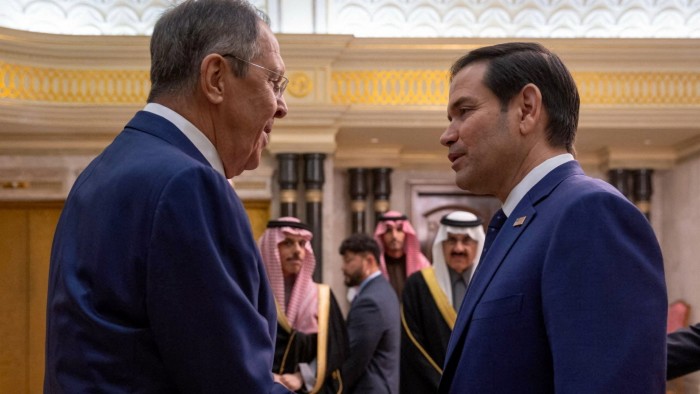Unlock the White House Watch newsletter for free
Your guide to what the 2024 US election means for Washington and the world
Russia used the first round of talks with the US over ending the war in Ukraine to demand the withdrawal of Nato forces from the alliance’s eastern flank, triggering concern in European capitals that the Trump administration could acquiesce to seal a peace deal.
Cristian Diaconescu, the Romanian president’s chief of staff and adviser for defence and national security, said on Wednesday that the US delegation had rejected Moscow’s demand, but that there were no guarantees that Washington would not eventually make this concession to Vladimir Putin.
“As far as I understand, the situation can change from hour to hour or from day to day,” Diaconescu told Antena3 television, in a reference to Donald Trump’s scathing criticism of the Ukrainian leader and his concessions made to Russia even before talks began.
Diaconescu stressed that the Russian delegation to the talks in Riyadh earlier this week “failed to convince the Americans” on a Nato withdrawal and that further visits by the leaders of the UK and France to Washington next week would seek to persuade Trump not to give in to this demand.
However, concessions to Moscow from the Trump administration in recent days — from ruling out Nato membership for Ukraine, to promising to normalise US relations with Russia — are making governments in the alliance’s frontline eastern states nervous about the US president’s intentions.
One senior official from the region told the Financial Times they were not sure their message was getting through. “We have extensively briefed DC at various levels, [I’m] not sure what is seeping through to Trump. So the risk and concern remains that Russia tricks DC into something via a push on Ukraine.”
The Russian president has long sought to restore his country’s sphere of influence in eastern Europe along the lines of the agreement reached by the US, the UK and the Soviet Union at the end of the second world war at a peace conference in Yalta.
The withdrawal of Nato forces from former Soviet and communist-bloc countries that joined the alliance in the late 1990s was one of Putin’s main demands to the US before he launched his all-out assault on Ukraine in 2022.
Trump further alarmed allies when he repeated Putin’s claim that Ukraine’s own bid to join Nato was the reason for his invasion. The US president also this week described Ukrainian President Volodymyr Zelenskyy as a “dictator without elections” — warning him that he could soon lose his country if he does not agree to a peace deal — and has shut European capitals out of early peace negotiations.
Romanian President Ilie Bolojan met his French counterpart Emmanuel Macron in Paris on Wednesday and came away with a conviction that European leaders in their contacts with the US will stress the need to be involved in any security arrangements affecting the region, Diaconescu said.
The current situation was “extremely complicated and serious”, Diaconescu added. “You can bet that we will fight until the last minute so that [this] does not happen.”
He warned younger generations of Europeans who had never experienced life behind the Iron Curtain that this moment could represent a return to the “gates of hell”.
“Gasoline lines, poverty, women dying in hospitals, people who do not have heating . . . two-hour TV adulations of the supreme leader. That is what Yalta means.”
Sandu-Valentin Mateiu, a Romanian defence analyst and former naval commander and intelligence officer, said Europe was again at a historic crossroads.
“Europe knows the lesson of 1938,” he said in reference to the Munich pact that gave Adolf Hitler part of Czechoslovakia but failed to stop the second world war.
The continent would not allow another undermining of its security arrangements, Mateiu said. “Europe will stand up,” he added, if the US were to withdraw its security guarantees, which would be “the worst scenario”.

“We have the old Russian idea of removing the US from the European security architecture, and leaving eastern Europeans at [Russia’s] disposal — their sphere of influence,” Mateiu said. “Until now the US answer was no — but I’m convinced Russia will continue. This was their strategy, their main policy after Putin came to power.”
The government in Warsaw so far insists that it has no reason to fear Trump abandoning Poland, while urging its European partners to respond to Trump’s call to boost the continent’s defence spending. Defence minister Władysław Kosiniak-Kamysz said on Wednesday that “the withdrawal of US troops is a scenario that Poland is not considering”.
But Trump’s handling of the talks with Russia has rattled Polish politics ahead of presidential elections in May and is unsettling rightwing politicians who have long claimed to be staunch adversaries of Russia as well as strong allies of Washington.
“This is now more Yalta for Ukraine than Poland, but we know that if Trump can sell Ukraine to Russia, he could do the same with the Baltic states or Poland, unfortunately,” said Bartosz Rydliński, assistant politics professor at the Cardinal Stefan Wyszyński University in Warsaw.
Additional reporting by Raphael Minder in Warsaw
Read the full article here




